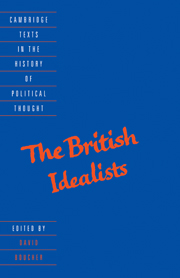Book contents
- Frontmatter
- Contents
- Acknowledgements
- Introduction
- Idealist biographies
- Select bibliography
- A note on the texts
- Evolution and society
- Individualism, collectivism and the general will
- 5 Ideal Morality (1876; revised 1927)
- 6 The Reality of the General Will (1895)
- 7 The Rights of Minorities (1891 and 1893)
- 8 The Dangers of Democracy (1906)
- 9 Individualism and Socialism (1897)
- 10 The Coming of Socialism (1910)
- The State and international relations
- Index
- Cambridge Texts in the History of Political Thought
5 - Ideal Morality (1876; revised 1927)
Published online by Cambridge University Press: 05 June 2012
- Frontmatter
- Contents
- Acknowledgements
- Introduction
- Idealist biographies
- Select bibliography
- A note on the texts
- Evolution and society
- Individualism, collectivism and the general will
- 5 Ideal Morality (1876; revised 1927)
- 6 The Reality of the General Will (1895)
- 7 The Rights of Minorities (1891 and 1893)
- 8 The Dangers of Democracy (1906)
- 9 Individualism and Socialism (1897)
- 10 The Coming of Socialism (1910)
- The State and international relations
- Index
- Cambridge Texts in the History of Political Thought
Summary
In our criticism of the view developed in Essay V [of Ethical Studies] we saw that, however true the main doctrine of that Essay may be, it is no sufficient answer to the question, What is morality? and, guided by its partial failure, we must try to find a less one-sided solution.
We saw (in Essay II [of Ethical Studies]) that the end was the realizing of the self; and the problem which in passing suggested itself was, Are morality and self-realization the same thing, or, if not altogether the same, in what respect are they different?
That in some way they do differ is clear from the popular views on the subject. Every one would agree that by his artistic or scientific production an artist or a man of science does realize himself, but no one, not blinded by a theory, would say that he was moral just so far as, and because, what he produced was good of its sort and desirable in itself. A man may be good at this or that thing, and may have done good work in the world; and yet when asked, ‘But was he a good man?’ we may find ourselves, although we wish to say Yes, unable to do more than hesitate. A man need not be a good man just so far as he is a good artist; and the doctrine which unreservedly identifies moral goodness with any desirable realization of the self can not be maintained.
- Type
- Chapter
- Information
- The British Idealists , pp. 97 - 129Publisher: Cambridge University PressPrint publication year: 1997



